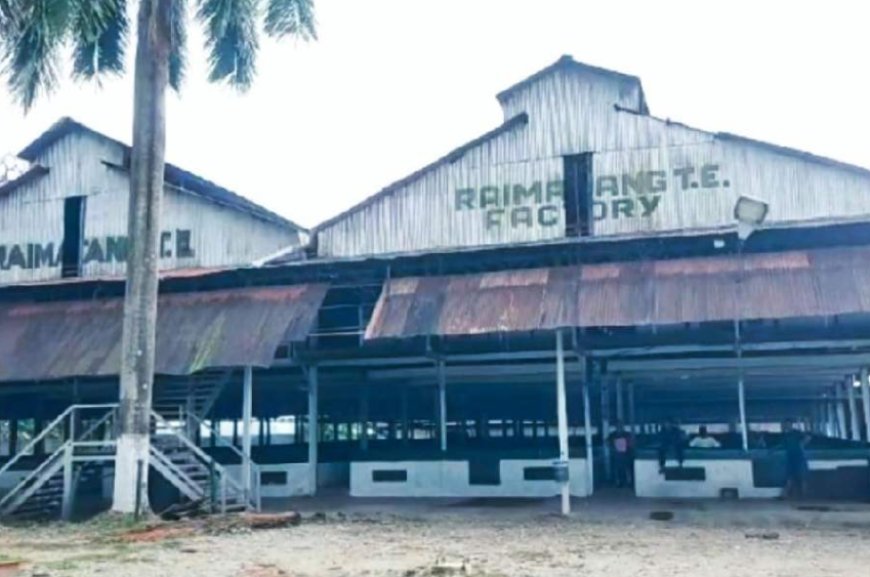Tea Plantation Disputes Lead to Closure and Job Losses in North Bengal's Brew Belt
Financial Struggles in the Tea Sector Highlighted as Plantations Close Over Bonus Disagreements

In addition to leaving almost 7,000 people unemployed ahead of Durga Puja, the closure and abandonment of six tea plantations in the Dooars over the course of the last four days due to disagreements over incentives has also highlighted the financial hardship that befalls north Bengal's brew belt.
Every year, the tea sector pays bonuses before of Durga Puja.
Representatives of tea planters' associations have stated that it is "simply unviable" to pay employees an annual bonus equivalent to 20% of their salary due to the recent virtual stagnation in tea prices and the steady rise in production costs.
However, senior trade union leaders are not prepared to accept the planters' case. They have claimed that several tea businesses attempted to offer bonuses to employees this year at a significantly lower rate than in previous years by claiming they were unable to increase their profit margins due to financial constraints.
Six gardens, two in Alipurduar district and four in Jalpaiguri district, have had their management close them or leave them empty since last Thursday due to disagreements with the workers on incentive rates.
The country's largest group of tea planters, the Indian Tea group (ITA), claims that the recent years have seen an extreme financial crisis in the tea business due to the inability of tea prices to keep up with the growing cost of production.
"Tea prices have increased at a compound annual growth rate (CAGR) of about 4% throughout the last ten years. However, throughout the same time period, the cost of essential inputs used in the production of tea, such as coal, gas, fertilizers, and chemicals, has climbed at a compound annual growth rate (CAGR) of between 9 and 15%. Additionally, in the last five years, workers' daily salary rates have climbed dramatically despite semi-stagnant pricing, according to an ITA source.
The insider continued, "Many tea companies have found it challenging to meet their financial obligations on the eve of the festive season due to the depressed price situation."
Currently, a tea worker in Bengal receives Rs 250 per day. Since the minimum pay rate for tea workers in the state has not yet been set, the state government made the most recent change in June of this year through a notification, increasing it by Rs 18 per day.
According to a senior planter from Siliguri, the prices of different teas at auction in 2023 had dropped significantly from 2022 levels.
The implementation of the Bharat auction system in April of this year was one of the main causes of this decrease. Although the tea board just voted to bring back the old English system, he claimed that since April, gardens had already suffered losses from the new system as a result of selling their teas for less money.
The average cost of a kilogram of tea at the Calcutta tea auction center decreased by as much as Rs 46 in certain previous auction sales, according to data that is accessible with the ITA.
Darjeeling tea was sold at an auction for less than its production costs. Additionally, compared to last year's prices, the prices of CTC and dust teas in some of this year's sales were about Rs 13 less in Assam and about Rs 11 less (per kilogram) in Bengaluru, according to a planter.
Planters claimed that the rise in production brought about by the tiny tea industry's advent is another factor that is disregarded.
An ITA spokesman stated, "Surplus teas have remained in the system as domestic consumption or exports didn't match production."
"On the export front, we are having problems as well," he stated. He claims that because of payment problems, the shipment of Indian teas to significant consumers like Iran—which accounts for about 20% of the country's total export market—has decreased by roughly 61% since 2019.
However, trade union officials are not prepared to accept the planters' position. Veteran trade union leader Alok Chakraborty, the chairman of the Darjeeling (plains) district in Trinamul, made the observation that the bonus that was due today was from the previous fiscal year (2022–2023).
"Although the auction prices decreased this year, tea companies nevertheless made a consistent profit in 2022 at higher prices. They can't just keep bringing up money problems to repeatedly deny the employees. In numerous gardens that are ill units, the unions agreed to bonuses at reduced rates. However, some gardens have been abandoned by tea companies, leaving workers without jobs before the festivities," he said.
Today's hill meeting
The bonus rate in the Darjeeling hills is still subject to change. The state labor department has called a meeting to discuss the matter on Monday.























































